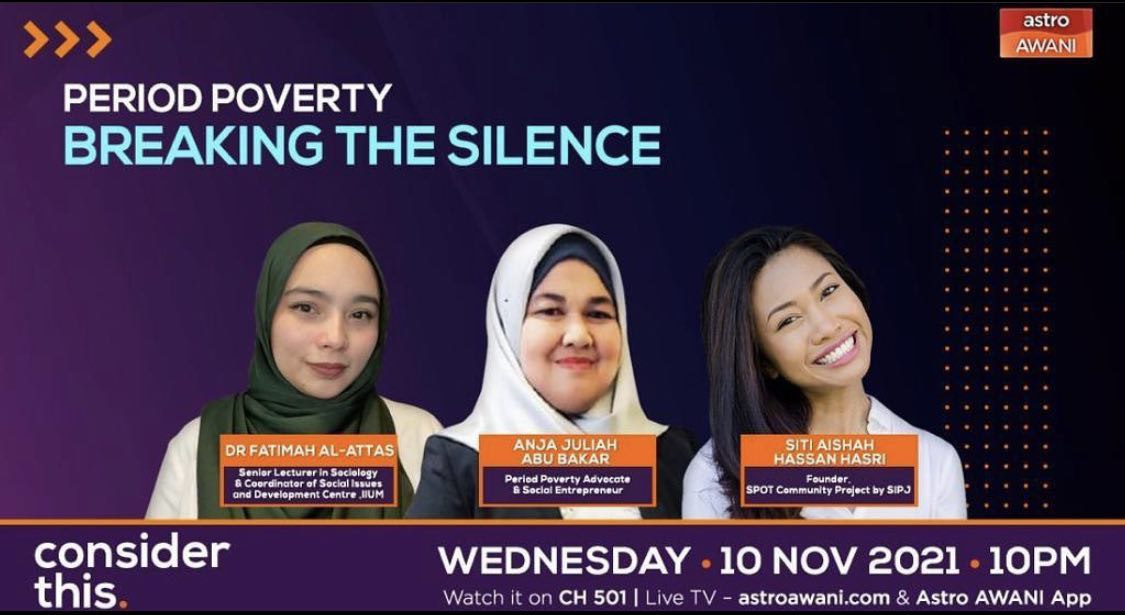By Syahirah Nawawi
KUALA LUMPUR, 14 November 2021: The issue and awareness of period poverty had grabbed societys attention even more either in real life or social media after the Budget 2022.
A segment called “Consider This” by Astro Awani had invited three guests to have some insight related to the issue of period poverty in Malaysia which was held last Friday (10 November) at 10.00 p.m.
The first guest, a senior lecturer from the Sociology Department of International Islamic University Malaysia (IIUM), Dr. Fatimah Al-Attas, had addressed four elements to think upon period poverty. The four elements are as follows:
- Sanitary products
Not having the access to any sanitary products, as in disposable sanitary pads, tampons, menstrual cups or reusable cloth pads. - Wash facilities
The second element refers to access to clean water, toilets and disposable management. - Education
Girls and women have been educated and exposed to menstruation and reproductive health. For instance, know-how and why they menstruate and the process as well as the cycle of it. As a result, this will aid them in understanding their own bodies. - Privacy
The privacy to manage menstruation with dignity. As in the toilet can be shut and locked properly along with not being shamed for having menstruation.
œWeve been focusing a lot more on the first element rather than considering all the four elements and how they may be impacting women in Malaysia, said Dr. Fatimah.
This refers to the 2022 budget where it only allocates menstrual kits which answer the first elements of period poverty not to forget only for teenage girls from B40 families.
She also stressed that this problem did not only exist in rural areas but also in urban areas. For example homeless women.
œThey may have access to education regarding how their bodies are, however, they are astray from the other elements due to certain issues such as economic issues, she added.
Dr. Fatimah instils three aspects to make people in Malaysia take this issue on a larger scale instead of individually, which are, (1) be curious (2) emphatise and (3) keep talking about this matter as our country is at the beginning stages in addressing period poverty.
At the same time, the founder of the SPOT Community Project by SIPJ, Siti Aishah Hassan Hasri stated that this serious problem is real and currently happening in Malaysia.
Some Malaysians are still denying and dismissing the period poverty not just because of economical and education issues but also culture.
œThe shame and stigma around menstruation ending up making the girls and women keep their problems to themselves, she pointed out.
As a result, this has created an unsupportive environment in the household and the absentee continued in school. Thus, it tremendously impacts the self-worth and identity problems of the girls.
To avoid this issue from happening, a Period Poverty Advocate and Social Entrepreneur, Anja Juliah Abu Bakar and her team have reached out to non-governmental organisations (NGOs) to start the conversation or discussing the period problems.
Back then, Anja and her team worked in silence instead of publicly, because it is the first encounter for them, which was not enough data on how many girls had dropped out from school.
After reaching out to NGOs and working with them, Anja mentioned that one of the alternatives is by inviting speakers who are among the former students who faced a similar problem by dropping out of school.
By doing so, the speakers will encourage the girls to voice out their problems and not keep to themselves.
Hence, it clearly shows that Malaysians regardless of gender have to face the truth about menstruation and period poverty that our country is facing instead of denying the issue.***
